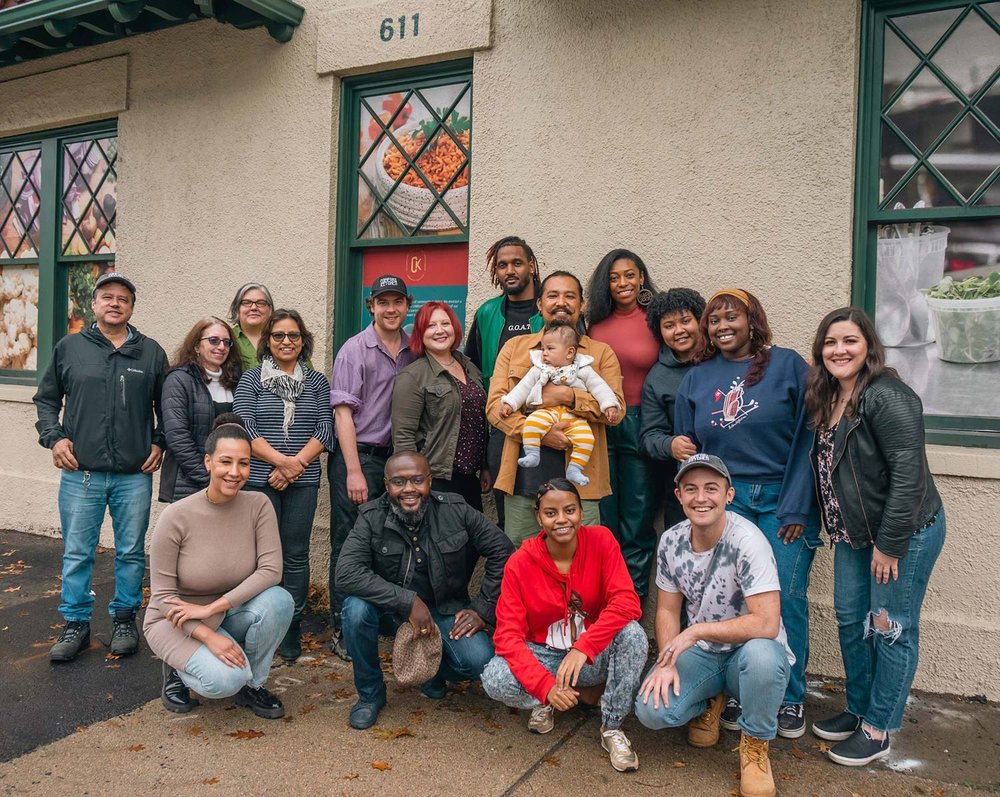“THE RESTAURANT INDUSTRY IS A KIND OF UNDERBELLY OF THE UNITED STATES, BECAUSE YOU COME ACROSS IMMIGRATION, FOOD SAFETY LAWS, FARMING LAWS, LABOR LAWS, WORKPLACES RELATIONSHIPS. EVERYTHING HAPPENS IN THE KITCHEN.”
Biplaw Rai — Comfort Kitchen, Managing Partner
Can you talk about the need for an endeavor like Comfort Kitchen in Boston? How did this business come together?
So on our team is myself, Chef Kwasi, his wife Rita who works on branding and marketing, and my wife Nyacko who does internal organizational development. I’ve known Kwasi since 2009, and back then we were working at a bakery called Hi-Rise in Cambridge. We were both immigrants, with different stories, working in the restaurant industry around Boston. The hospitality and restaurant service industry is so dominated by immigrants, but our stories are never told, and our food is never presented on the table. The chefs that are working in the back are never given the spotlight.
Fast forward to 2015, I co-founded a cafe called Dudley Cafe at Nubian Square. At that point, Kwasi and our Chef de Cuisine Shelley Neeson were doing Ghanaian street pop up, called Chop Bar. They would host that at Dudley Cafe once a month, along with [an] open mic night called Hope Inc. They did this for about five years at different locations around town. But Kwasi and I always talked about telling our own stories through food, and eventually we did that.



What are you most excited about in regards to joining the Ujima Good Business Alliance?
Our team at Comfort Kitchen shares a lot of the same values as Ujima. When I first learned about Ujima’s Good Business Standards, I thought of how many problems they would address if more businesses implemented them.
In some ways, the restaurant industry is a kind of underbelly of the United States, because you come across immigration, food safety laws, farming laws, labor laws, workplaces relationships – everything happens in the kitchen. The kitchen is also a very intense place, because it's such a small space, but so many things are happening. We were already thinking about the issues that the standards touch, so it was a very natural progression for us to be in stronger association with them.
Can you share the team’s visions for Comfort Kitchen and the new space?
We really understand that food is not one dimensional. So while we serve delicious food, we know that everything around it is what makes the place special. For the physical location, we wanted to create a space where everyone can come in, feel safe, sit down for a cup of coffee, and get a great dinner.
We’re in the cross section of a neighborhood that is, on one side of Columbia Road, made up of families that have disposable income that are able to go out to eat a couple of times a week, no problem. On the other side of Columbia Road, we have, you know, lower income neighborhoods that don't necessarily have the luxury of doing that.
To accommodate this, our concept is to have an accessible cafe in the morning, where people can have a comfortably-priced lunch. Then we close in the afternoon to recalibrate, and reopen for dinner at a higher price point, because it’s very curated and somewhat of a destination for folks. We’ve got to pay our bills, but we also want people from all walks of life to come visit us.
So a few years from now, I envision the cafe to be bustling with people from all walks of life: artists, activists, and people who live in the area. We have two patios on the sides of the building that are going to be very beautiful. So during, you know, during warmer times, people can sit outside and hang out. We're not going to kick people out because they're not buying a drink or shut off the internet because we only want people to focus on food.
I also want to stress that we went through a human centered design process when we were creating Comfort Kitchen, so we could respond to community needs. Without our community's help, we would not have gotten to this point. I’m also grateful for the deep relationships our staff team has built, it’s what makes us so resilient. ♡
The Comfort Kitchen team is composed of Biplaw Rai, Nyacko Pearl Perry, Kwasi Kwaa, and Rita Ferreira.
Biplaw Rai is Managing Partner at Comfort Kitchen. A Nepali-born culinary entrepreneur and community builder, Biplaw channels his passion for food, culture, and community to create intentional, collaborative spaces that connect people from all walks of life. Biplaw fervently supports those who share his love of food as a member of the Advisory Board for Future Chefs, a nonprofit that provides teens with culinary training, and by offering management, construction, sourcing, and financial coaching to fellow entrepreneurs. He is also an accomplished public speaker, sharing his stories of immigration and advocacy to educate audiences on culture and food, how to build community spaces, and equity in the food industry. Biplaw speaks three languages: English, Nepali, and Hindi and resides in Dorchester, MA with his wife Nyacko, son Justice, and two dogs, Momo and Moxie.
